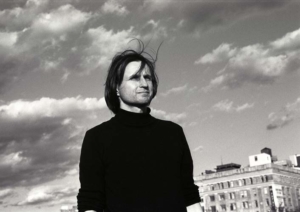 In The Beach Beneath the Streets, McKenzie Wark set out to tell the tale of the Situationist International, a “small band of artists and writers whose habits were bohemian at best, delinquent at worst, who set off with no formal training and equipped with little besides their wits, to change the world.” Given our present historical moment, we could do worse than revisit such experiments in the everyday. As the Situationist writer René Viénet said, “our ideas are on everybody’s mind.”
In The Beach Beneath the Streets, McKenzie Wark set out to tell the tale of the Situationist International, a “small band of artists and writers whose habits were bohemian at best, delinquent at worst, who set off with no formal training and equipped with little besides their wits, to change the world.” Given our present historical moment, we could do worse than revisit such experiments in the everyday. As the Situationist writer René Viénet said, “our ideas are on everybody’s mind.”
I sat down with Dr. Wark in his office at the New School, where he is an Associate Professor of Culture and Media. We discussed the legacy of the Situationists for a new generation of revolutionaries, the resonances and ambiences of Occupy Wall Street, and the role of protest in the absence of politics.
In the preface to The Beach Beneath the Streets, you mentioned being part of radical political and bohemian movements as a youth.
Well, it was a bohemia of no great significance, Sydney. I’m originally from an industrial town with a great labor movement tradition, so I was fortunate to be trained by people in a town with a labor movement who still controlled the waterfront, the steel unions and things like that. I think that was a really good education to do things like covertly hand out literature to steel workers. To later have “occupied” the front lawn of Parliament House in Canberra at the age of 17 was also a wonderful thing. I discovered at the age of 17 the weird way that cops twist your arm when they are trying to move you along; you can’t not move when they’ve got your arm in that weird hold. And of course I immediately got off the steps of the Parliament House because I’m a coward, so I don’t want to oversell this, but even having a minor part in a minor provincial bohemian and political world was a really good preparation for writing about the Situationists.
How long has The Beach Beneath The Streets been percolating? I think the success of the book is that you are able to paint the picture of the Situationist milieu and give the biography of a movement, instead of reducing it to a few key players.
It took a long time to write, and there [were] a couple of abandoned book length manuscripts along the way. I never wanted to do a biography. One was arranged alphabetically like a dictionary, but it just wouldn’t write itself. There is a book length chunk of this thing that just didn’t work, so I had to throw the whole thing away and start all over again. But it’s kind of liberating to do that. It’s been going on for years and in some ways The Beach Beneath the Street is a prequel to some books that I wrote in the early part of this century — A Hacker Manifesto and Gamer Theory. These were détournements of Guy Debord and Raoul Vaneigem, respectively. I wasn’t satisfied with my footnotes to that, so this was a kind of excavation of what I thought was living and dead in the Situationist International.
The ideas that stretch across this period seem to be really congealing in your writing about Occupy Wall Street.
Even before this stuff I was interested, on the one hand, in the concept of the spectacle — which is treated as this evacuation of historical time and complete nullification of any kind of practice. There is a link there from Debord to Jean Baudrillard. On the other hand, no one reads those later chapters of Society of the Spectacle, which are about the total opposite. They are about détournements and possibly a somewhat limited notion of workers’ councils, but nevertheless certain kinds of practice. So I was always interested in moments that punctured the spectacle. In my first book I wrote about Tiananmen Square in 1989 and on the Wall Street crash of 1987. It never occurred to me that the politics of occupation practiced in Tiananmen Square could actually be applied to Wall Street. I wrote this book that’s got the two pieces, and I didn’t put them together. To the credit of David Graeber and a few other people, they figured it out that you can occupy an abstraction by occupying this place called Wall Street that doesn’t exist.
This also passes through May ’68, which was also a dual occupation. It was an occupation of the factories and parts of the Latin Quarter. But the two are never put into communication, and that’s its downfall, in a sense.
Henri Lefebvre, who gets a chapter in your book, described the Situationist mode of aesthetic practice as “tactical”: tactical in how the Situationists negotiated spatial practices, and in how their art became part of the world. Given the at times paternalistic and moralizing tone of many commentators about what this occupation signifies, do you think the Situationists can teach us anything about latent tactical practices or perhaps the politics of self-representation?
Well, I’m reluctant to say that the occupation needs somebody else to tell it what it is or should be doing. The two pieces I wrote for the Verso blog were very much about reporting.
Lefebvre leaves the Communist party in the 1950’s. The invasion of Hungary was probably the last straw, as it was for other people. As he goes looking for other forms of revolutionary practices, the Situationists become one that he identifies. And I think they’re a bit pissed that they are only one amongst a list, as there are other things he thinks are interesting as well. What he is after is forms of organization, within the space of the everyday, that are able to crystalize out moments and find ways of repeating them and [ensure] that they are secured tactically. You can certainly read how the occupation has worked as being exactly that. I think it’s done this on a double terrain. There is this actual place, and you can go there — I even wrote a little psychogeography on how it looked on one particular night. It was really kind of quite interesting. People were figuring out collectively what to do with a particular space. But it also ramifies throughout this abstract space. You are occupying another landscape as well, which is media terrain, with this sign that Wall Street is occupied. That becomes something with a global ambience, with people trying to figure out how to replicate that. Occupy LA is outside city hall and people are saying “Why aren’t we out on Rodeo Drive? That would make more sense.” It opens an interesting question, because Wall Street is everywhere, in a sense. You could occupy Corona Park in Queens and say you’ve occupied Wall Street, because it is there too.
Why do you think “occupation” has become such an important supplement to all of these “democracy-in-crisis” arguments?
The first thing to note, which isn’t often noted, is the extraordinary reversal of effect of the word occupation. Formerly one would immediately think of the German occupation of France, or the American occupation of Iraq and Afghanistan. So it involves a reversal of the significance of the term. Lefebvre was already talking about how colonizations become internal, so there is a kind of reverse colonizing involved in the whole idea of an occupation. So one changes the meaning of a word. Words are reversible, as Jean Baudrillard pointed out. That’s kind of interesting, even before you start doing anything else with it.
Occupation is a tactic. It will work and then it won’t work, in the same way that mounting big frontal social movement assaults on [the] G7 meeting worked and then stopped working. It turns out it’s of no great significance that heads of state all meet because they don’t really decide anything anyway.
Do you think occupation works now because these spaces are evacuated of any sense of community, and this primes them to be occupied?
A little Situationist inspired psychogeography wouldn’t go astray. There’s a logic to what is going on Zuccotti park, which isn’t really even a park. It’s a pubic/private space that’s all concrete and planters and windswept with the weird sculpture up on one end, as these things always have. But it’s quite appropriatable. It’s in the shadow of these buildings. There are already all these coffee carts there. The only thing it lacks is toilets. There’s a kind of intuitable set of ambiences and flows of spaces in cities and that ended up being a relatively good one, for the time being. Ironically, it got kind of gentrified at some point, so people took off last weekend and took over Washington Square. But that one is temporary because that park shuts after midnight. Different rules apply.
Police have been a factor not just in recent occupations (e.g. student occupations at the New School or UC Berkeley), but also in the London riots of the summer. Do you see a link between riots and occupation, in the eyes of the police and of the participants?
I think the least common analysis of riots is how it is a rational tactic. It’s usually decried as this terrible breach of order, or as being sub-political, as if something needed to be added to it. These people need to come to meetings and formulate an agenda, and they are just not going to do that. This just puts middle class wankers back in charge. The people who do the riots do it because they don’t have access to a language that anybody will listen to; it cannot be passed into media speak. So it is a logic of acts, having to do with reacting to repressive policing, because that goes in cycles. In Britain they’ve moved away from kinds of community policing to the policies of the mid-’80s, that we know caused violent response. So it’s a purely logical tactic to apply: if the police start beating up people and even killing people for no obvious reason, then obvious flouting of the law is a tactic to respond to that. It has various sub-logics. One has to do with lack of access to space. Another with selectively choosing what kinds of circulation of commoditized desire seem most out of reach. Hence, it’s interesting that people steal necessities and luxury goods and not a whole lot in between. There is a kind of logic to what gets appropriated.
In a piece you wrote called “How to Occupy an Abstraction” you wrote that “the key is keeping the focus on the abstraction that is Wall Street, the pernicious effects of which pretty much everyone feels in their daily life.” What is the mood that you are describing here? Is it a malaise, or something perhaps more threatening?
As Leonard Cohen says, “everybody knows the dice are loaded, everybody rolls with their fingers crossed.” What a fantastic song about ideology. There is no deception involved. Everybody knows. You just make do the best you can. Everybody knows there is a Rentier class that is no longer functional for the rest of the economy. My slogan for the 2008 elections was “put the ruling class back in charge.” That would in fact have been progress if in 2008 we were actually able to have a ruling class that ruled again. My slogan the day after the election was “let the disappointment begin,” because it seemed immediately clear that we were not going to get it, and we didn’t. We do not have a state that is able to articulate the common interests of a ruling class anymore. It is beholden to a Rentier class that simply wants to clip coupons and live off the bonds it already has invested. It doesn’t give a rat’s ass about productive development of the economy that would employ people and create new products, so the Onion had it exactly right with the death of Steve Jobs: “Last American Who Knew What the Fuck He Was Doing Dies”. It seems like the ruling class has no fucking clue about how to do anything, except loot the state and do dodgy financial deals that, in the end, loot the state. And if you suggest that there is anything wrong with this they threaten to take their ball and go home.
There’s that sense that even if you were a kind of mainstream liberal, or even conservative, that there is something deeply disappointing in having a ruling class that is not able to articulate a common purpose that people can actually extract something from. I think that the rhetoric of the 99% ended up being extremely powerful. It put this logic of class back on the table that was quite intelligible: “we are the 99%”. Well, actually we’re not, we don’t see many African Americans and undocumented farm workers showing up. But with that caveat I think it’s still really helpful to say, “Look, the first piece of class logic has to do with the Rentier class and their inability to even offer us a functioning capitalism.” Even that would be progress.
Do you see this as giving a new spin on all this talk of “austerity?”
The other logic of austerity is that if you are not afraid of a population and it seems completely sutured into a kind of passivity and yearning for the commodity form, then you don’t really have to offer anything. Margaret Thatcher was the great genius of figuring this out, to offer people nothing but their own aspirations. But I think this is starting to implode a little bit, and hence this Legitimation Crisis that is starting to become very apparent here in the United States and Europe. That’s not the same as politics in places like China and India, where I think dissent is internal to the logic and authority of the state. There is dissent, but within the understanding that the development project is still working.
I’ve recently been reading some works by Charles Fourier, and I saw a film called the Black Power Mixtape 1967-1975 last weekend. I see these as perhaps offering two ends of a spectrum of possible readings that one might offer to people at Zuccotti Park: with Fourier you get an elaborate and expansive vision of alternative forms of human organization, work, and sociality. With the Black Power Movement you get an example of a previous social movement that was, temporarily, able to develop forms of political organization from a position of exclusion. I’m wondering if you think either of these routes is helpful to the occupiers, or whether you’d provide a different reading list?
It’s funny you mention Charles Fourier, because the sequel to The Beach Beneath the Street is called Spectacles of Disintegration. It should be out in about a year. I didn’t really do Raoul Vaneigem in the first book because he’s still alive and still writing. Fourier is much more central to him than to Debord. I ended up writing a very, very long chapter just on Fourier because I thought “oh my god, this stuff is just fascinating.” And it strikes me as not well read at the moment either. Fourier got co-opted by the Utopian Socialists and then by the Freudians with the liberation of desire. What hasn’t yet quite happened, though Jamison starts to do it, is to put all that stuff together and see Fourier as an ethnographer, which is the last thing you would expect. He worked as a commercial traveller, spent time in cities where he saw brutal class struggle, saw the merchant class up close, was in the middle of a civil war, and fought on both sides, spent years trying to find patrons. He had this extraordinary range of experiences.
I wanted to open up Fourier as an alternative to the Jacobin roots of the dominant leftist politics of the time, because he’s fiercely anti-Jacobin. He’s also anti-egalitarian, interestingly enough. He thinks you need some kind of symbolic stake that enables people to differentiate themselves, even though you are guaranteed the basic minimum, not only of food, but of love for everyone. But after that it is all a game about anything that you could possibly imagine, where there are clear differentiations and that is what motivates everybody to do everything, including pick up the trash. So that, to me, is a wonderfully inspiring and utterly confounding different model than anything you’d find in Badiou, Ranciere, Zizek, Agamben, or Vattamo.
It strikes me as really interesting to start digging up these different logics. There is also a brilliant and unexplored Queer Theory in Fourier. It isn’t gay, queer, or straight in Fourier. There are 12 different possibilities for sexuality involving all the senses — including some that you didn’t know you had. So that to me is extremely freeing, and I think it’s time to read him again.
You have called Occupy Wall Street a “weird media event.” This is a concept that you developed back in the 1990s. Can you say a little more about it, and perhaps how it has changed as we move through the early parts of the 21st century?
I was already writing bits of it in the late ’80s, and then in a book that came out in 1994 called Virtual Geography. The examples of the weird media event in that book were first Tiananmen Square, the fall of the Berlin Wall, the Stock Market Crash of 1987, and finally what we would now call the First Gulf War, now that there has been a second. The weird global media event is an event insofar as it is not regularly scheduled. It comes out of nowhere. It is global in the sense that it invokes a world. It isn’t necessarily universal. Not everyone necessarily cares about 9/11 in the same way, for example, but it invokes a world. And it certainly suggests a kind of geography of where it is resonant. It’s a media event in the sense that it is not something that happens in a place and then the media talks about it, which is the model of the liberal public sphere. It’s that it always already happens simultaneously in a media space and physically proximate space at the same time. Tiananmen Square is an incredibly psychologically and historically resonant place. To occupy that is even more powerful than to occupy Wall Street, because Tiananmen Square has meant something for hundred and hundreds of years. It is many layers deep with resonance, so to be there suddenly invokes the whole of history.
And the event is weird in the sense that the pre-cut narratives don’t work. So as soon as the event happens everyone is scrambling for the story, and the way to study media is to look for the moment when no one knows what’s going on. When stuff like this happens, the first thing to do is the equivalent of roll tape, to record everything because you’ll get all of these attempts to explain something away, or collect these images people no longer want to show. I have tapes of the first 48 hours of 9/11 coverage. You saw people commit suicide jumping out of the towers, and you never see those images again. They are edited out because you cannot put that in the narrative. It just doesn’t fit. It is just too hard, too painful. But they were broadcast, that was there. All these crazy theories about what might have been happening, it’s all there. You get the great white commentators coming out of retirement to explain what the fuck is happening. These are all signs of the weirdness of the event.
So there’s a methodology to studying those. The thing I loved about Occupy Wall Street was that for the first time I got to frigging be there. I couldn’t fly into Tiananmen Square and I missed the fall of the Berlin Wall. I regret that, but this one happened right here and I got to go there — not immediately, but straight after it happened — and feel the ambience of it.
Does the methodology change over time?
The whole thing about what I’m calling “vector” or media communication in general is that it’s abstracting. It creates an abstract space, but there are certain qualities that space has, depending on what it is built out of. So, for example, Tiananmen Square was all about a global feedback loop caused by satellite television. This is where you realize it’s an event. People are reporting from Tiananmen Square, that signal is going all around the world, and then is being fed back in. People are trying to figure out what is going on from this repeated signal that is coming back in from around the world. That’s one of the things that these people have to know, this weird signal about what it is that they are doing. Yet the Roneo also mattered in Tiananmen Square for photocopying. With these different certain kinds of technology in play, you have to ask what vectors are available and how they shape the possible space of the event.
By the time you get to Occupy Wall Street, it’s all about Twitter, for example. You notice both good and really bad things about Twitter. It’s a fantastic rumor machine, for one thing. I got to actually go down on the night of the 5th of October to see what the hell was going on, because Twitter gave me this completely misleading view. It was all about a set of really aggressive confrontations with the police. But if you went to Zuccotti Park that was absolutely not what was happening. It was a party. But that’s not news on Twitter. That’s not interesting to put into 140 characters; how do you do that? My least reposted tweet ever was “I was in the park. It was a party. Everyone was having a good time. No problems with the police.” No one retweeted that; it’s not interesting at all. Everyone wanted to say “there’s cops with vans…” You discover that there is an envelope of possibilities, or what some people call affordances, attendant to any vector. It’s not determining, but it shapes a space in which certain things happen.
Hegel says somewhere, “hell is truth seen too late.” There is a sense that it’s in the very nature of the event that you do not know what is happening until afterwards. There is a kind of time lag, or a time series effect about it. So 20 years after, we have a pretty good idea of what happened in Tiananmen Square. We’ll never know what happened at Occupy Wall Street this week or next week, but in a few years time someone will tease it all out. Some police documents will shake out. It is about understanding this time-lag series, rather than saying there is the full spectacle and the true reality. No, it’s all about the time series, and you get more and more nuanced and detailed accounts through time, but you can’t act on those because you act in the fog.
Other intellectuals — Zizek, for example — have been speaking at Occupy Wall Street. How do you see your role in relation to them?
Zizek has his role, and he plays it to perfection. And I kind of admire that, so it’s important that he went there. He belongs to a series of people who spoke. It’s an interesting series of people. It’s Cornel West, Bill McKibbon, Michael Moore, Reverend Billy, and I’m sure I’m missing a few more. But these are the people who can generate a certain kind of symbolic energy.
I was trying to do something completely different, which was to report. I was a journalist and I wanted to report what happened. It’s a slightly eccentric version of journalism, because I wanted to report on how concepts organically emerge out of practices, and that’s not what American journalism is usually about. But that is what the two pieces I did attempt to do. They are not about either telling a movement what it ought to do, or about being the recognizable face that can come in and speak on their behalf. I’m anonymous, I just go there as a regular person.
The first piece I wrote circulated much better than the second. It’s interesting if what you’re saying is that there is something here that is not about conflict, it’s just about being. It’s much more fun to talk about arrests, and I’m not saying it’s unimportant to talk about who gets arrested, but to say that there is something else happening, the struggle to occupy a place where you are not buying or selling anything, and not even arguing about anything, you’re just trying to be with other people, and seeing how difficult that is as a form of life. Whatever being? That’s the interesting thing about Agamben, that this whatever being could happen.
It’s extremely hard. That was my sense at Zuccotti Park on the 5th. There were people walking around with this look on their faces like “what the fuck are we doing?” Not in a bad way, just sort of gobsmacked that “I’m just being, here. And the cops aren’t trying to arrest me. No one is trying to sell me something, and I don’t have to be part of an argument. And some people are there making love, but I don’t have to do that. Some people are trying to sleep. Some people are dancing. Some people are chanting.” There are all these different responses to the problem of being, outside of commodification and logics of opposition. And to me that’s a really fundamental experiment for people to try. Can we exist? Is ontology possible?
This post may contain affiliate links.







